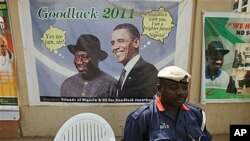Campaigning is underway in Nigeria for April's nationwide vote after electoral officials wrapped up a month-long voter registration program.
Nigeria's voter registration got off to a slow start with many electoral commission workers struggling to link computers, printers, digital cameras and fingerprint scanners to produce voter identification cards on site.
Long lines of prospective voters criticized electoral commission preparations, especially as the entire exercise had already been postponed from last year. So the electoral commission extended voter registration by two weeks and sent out technicians to help solve computer problems at more than 120,000 registration centers.
After a poor beginning, voter Philip Omokpoma gives the electoral commission a passing mark of 70 percent.
"Most of them did not know about the machine until they were able to go around and bring in some technicians to assist them," said Omokpoma. "After that, they were able to cope, and the number of persons they registered became increased."
Voter Nora Kamene said the registration was a success and should lead to good elections. "From the outcome, the turnout, it was very encouraging. And I think the election will be OK. From the turnout, the election will be free and it will be fair, by God's grace," said Kamene.
Voter Ovie Omowakpoma said registration should have been extended another two weeks because he said many people in Delta State have not registered.
"If they stand by what they are doing now, then there is no credible election," said Omowakpoma. "These machines should be kept in local government areas at least for another two good weeks to see those who have not been registered."
The electoral commission did add another 48 hours at the end of the process to cope with last-minute registrations. Wrapping up the exercise, the Independent National Electoral Commission thanked Nigerians for their patience.
Lagos State Electoral Commissioner Adekunle Ladipo said the voter rolls will be the foundation of a strong vote in April. "I just want to assure Nigerians that INEC has set out on a good note and we intend to conclude on a very successful note, and that is giving Nigerians free, fair and credible elections, come April this year."
More than 70 million Nigerians were eligible to register for April's presidential, legislative and gubernatorial elections.
Campaigning is now underway. President Goodluck Jonathan launched his campaign in Nigeria's "Middle Belt" between the mostly-Christian south and predominantly-Muslim north. His candidacy disrupts an informal regional power-sharing deal that would have given the ruling-party nomination to a northern candidate.
This means Jonathan needs to do well in central states to offset what could be opposition from some northern voters. The president's three main challengers are all from the north, which could split the vote there. Political observers say the opposition's best chance of defeating the ruling party is forcing the vote to a second round where President Jonathan would face a single opponent, likely from the north.
Nigerian Voter Registration Closes, Campaigning Begins




